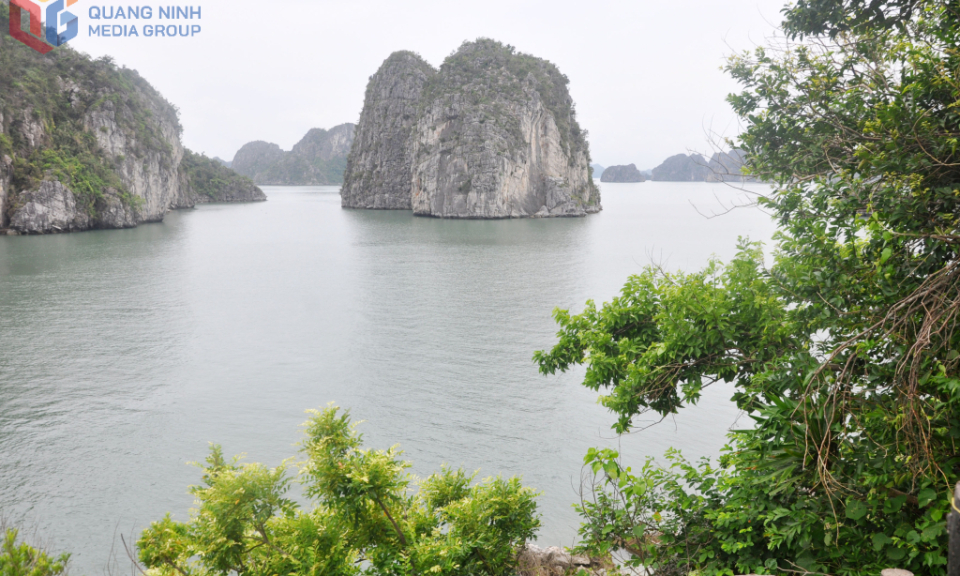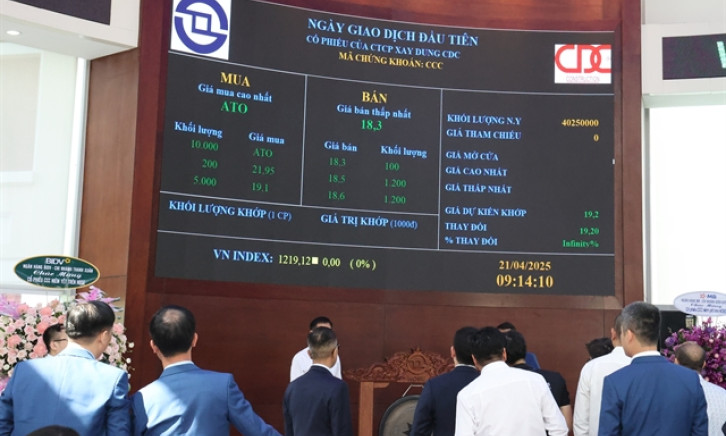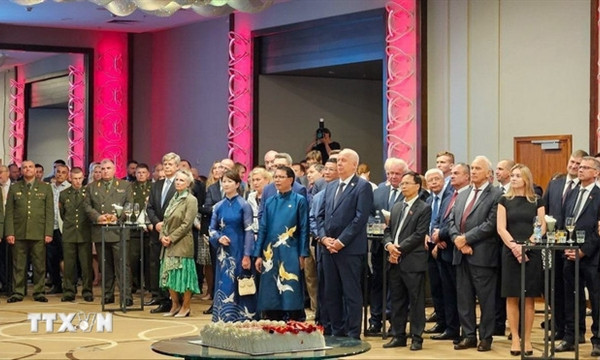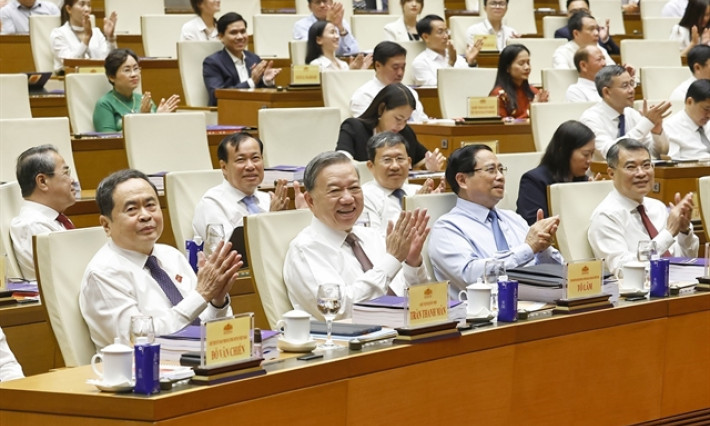Việt Nam leads the way in green agriculture, sparking a new era for the food system
Việt Nam is now at the forefront of this transformation, ushering in a new era of sustainable, inclusive and resilient agriculture.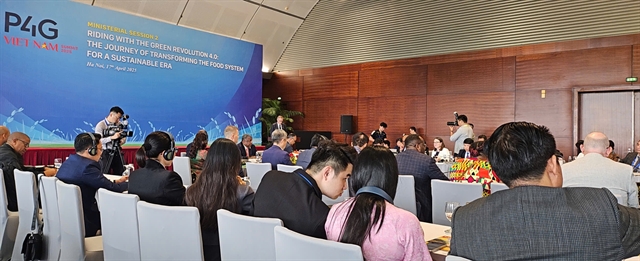
As the world is confronting intensifying climate challenges and growing food insecurity, transforming the food system has become not just an aspiration but an imperative.
Việt Nam, a country with a rich agricultural tradition and a growing global footprint in food exports, is now at the forefront of this transformation, ushering in a new era of sustainable, inclusive and resilient agriculture.
This structural reform sends a powerful message: agriculture and environmental stewardship must be addressed in unison.
Chairing a session themed 'Riding with the Green Revolution 4.0: The Journey of Transforming the Food System for a Sustainable Era' on Thursday morning in Hà Nội, Minister of Natural Resources and Environment Đỗ Đức Duy upheld this vision.
"The food system is not only a matter of production or consumption. It is a foundation of national resilience. By integrating agriculture and environment under one roof, we are ensuring that every decision balances economic progress with ecological responsibility," said Duy.
Việt Nam’s National Action Plan on Food Systems Transformation exemplifies this integrated vision, promoting inclusive economic growth alongside green production and consumption.
From rice paddies to dairy farms, stakeholders across sectors are now rethinking the way food is grown, processed and delivered.
Among the leading Vietnamese enterprises pioneering this green transition is Vinamilk, the country’s largest dairy company. Given its commitment to achieving net-zero emissions by 2050, its roadmap includes a 15 per cent emissions reduction by 2027 and 55 per cent by 2035.
Executive Director - Production and Head of the Net Zero Project at Vinamilk, Lê Hoàng Minh, said: "With our scale, 13 factories and 130,000 dairy cows, our green transition is not just about our sustainability targets. It influences the entire dairy industry and community partnerships across Việt Nam."
This ambition is already being realised.
Vinamilk has implemented cutting-edge technologies, including AI-powered inventory and energy-use prediction systems, solar energy, biogas solutions and circular agriculture practices.
In 2024, the company reduced carbon emissions by 9.2 per cent per tonne of product compared to 2022 while producing 23 million kWh of solar energy and recycling organic waste into fertilisers used by local farmers.
Its Green Farm model, active in four provinces, represents a holistic system where emissions are halved compared to global averages. With roof-mounted solar panels, biogas digesters and smart livestock management, the farms demonstrate the potential of regenerative agriculture in a developing economy.
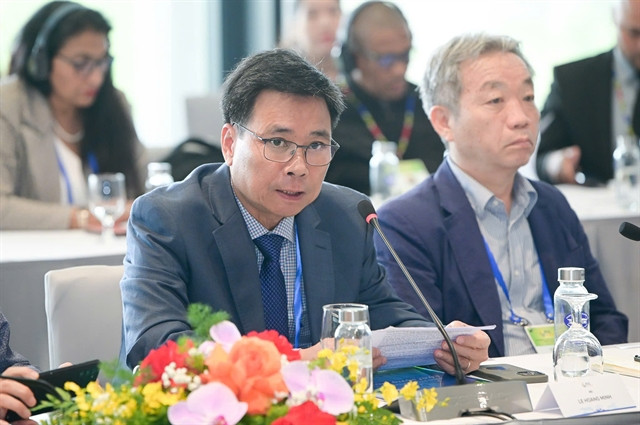
Talking to Việt Nam News on the sidelines of the session, Minh said that P4G is a very valuable event for businesses, especially in applying green-oriented sustainable development models.
"We have the opportunity to seek potential partners through the booths and exhibitions of start-ups at the event, aiming to apply their solutions to our production activities, including the use of renewable energy and soil protection technologies on farms," he said.
Beyond technology
"Food is not just about nutrition – it’s culture, it’s economics, and it’s happiness," said Ani Dasgupta, President and CEO of the World Resources Institute.
He emphasised that while scientific advancements exist, the challenge lies in turning knowledge into practice across the entire food value chain – from farm to fork.
This transformation must be inclusive.
Associate Vice-President of the International Fund for Agricultural Development Donal Brown said that innovation will only work if it actually reaches those most in need of it: smallholder farmers, women, youths and ethnic minorities.
In Việt Nam, companies like A An Food JSC are putting this philosophy into practice. Specialising in high-quality rice exports to Japan, Korea and the EU, A An is part of the Government’s 'One Million Hectares of High-Quality, Low-Emission Rice' programme.
"To meet global standards and access high-end markets, we’re working closely with cooperatives and farmers, integrating green practices from the field up. Reducing pesticide use not only boosts the value of our rice but also improves farmer health and incomes," Lê Anh Nam, Deputy General Director of A An Food, told Việt Nam News.
"The green transformation isn’t just about carbon. It’s about people. The farmers benefit from healthier soils and better earnings, while consumers enjoy cleaner, safer food. It is shared value in action."
Partnerships for planet and people
Việt Nam’s approach is strengthened by international cooperation. Through strategic partnerships with countries and organisations, the country is actively sharing and adopting best practices.
Irish Ambassador to Việt Nam Deirdre Ní Fhallúin praised this collaborative spirit.
“Việt Nam has shown strong commitment and leadership in building sustainable food systems. Our work together in monitoring and evaluation frameworks helps ensure that policy decisions are grounded in evidence,” she said.
Ireland is also supporting AI-based rice optimisation, while Denmark offers expertise in low-emissions livestock systems. Such collaborations are critical to ensuring that Việt Nam’s food systems are not only productive, but also resilient and internationally competitive.
Rice, a staple crop in Việt Nam, is both a symbol and a stress point in the sustainability transition.
As Dasgupta noted, it contributes around 10 per cent of agricultural emissions globally due to methane release. Yet, Việt Nam’s adoption of alternate wetting and drying irrigation techniques is proving how traditional practices can be revolutionised through science.
This method has been incorporated into Việt Nam’s nationally determined contributions under the Paris Agreement.
The P4G platform further showcases start-ups like Indonesia’s Wastex, which converts agricultural waste into biochar, turning emissions liabilities into assets.
The journey to transforming the food system is complex, but Việt Nam offers a roadmap rooted in innovation, collaboration and human-centred development.
As Minister Đỗ Đức Duy declared: "This is a revolution of responsibility, a commitment to our people, to our planet and to future generations."


